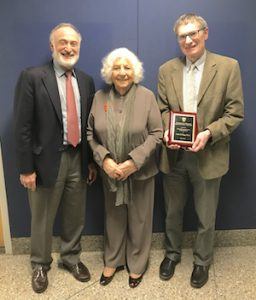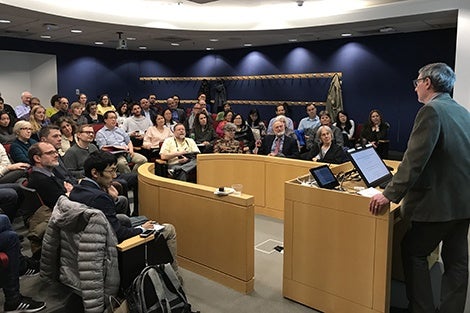May 7, 2019 – At one point during his May 2, 2019 talk about the challenges facing leaders of biostatistics departments, Colin Begg showed an image of the comedian Rodney Dangerfield with Dangerfield’s famous line: “I don’t get no respect.”
Audience members chuckled. Begg, chairman and attending biostatistician at Memorial Sloan-Kettering Cancer Center (MSKCC) and professor of biostatistics at Cornell University, explained that biostatisticians are not always very high in the medical field pecking order. He said the field of statistics has always had an image problem. “To many people, [statistics] is just a collection of facts,” he said, and a statistician is “someone who carries around information like baseball averages or the population of the U.S.”
Before a standing-room-only crowd in FXB G13 at Harvard T.H. Chan School of Public Health, Begg received the annual Marvin Zelen Leadership Award in Statistical Science and delivered a lecture that touched on topics including the evolution of the field of biostatistics, characteristics of the statistics tradition, collaboration in statistics, and his experience leading his department at MSKCC.

The Zelen Award honors the career of Marvin Zelen, who was a driving force behind biostatistics departments at both Harvard Chan School and Dana-Farber Cancer Institute.
Richard Gelber, professor in the Department of Biostatistics at Harvard Chan and Professor of Pediatrics (Biostatistics) at Harvard Medical School, introduced Begg, an expert in developing statistical methods for cancer epidemiology. Gelber said that Begg helped build the MSKCC biostatistics department from about eight members in 1989 to roughly 100 today and has overseen a fourfold growth in research output. Begg previously worked at Harvard Chan School as part of Zelen’s research group.
Begg said that the field of biostatistics has evolved over the past 40 years to handle larger and larger amounts of data and has become more specialized.
He emphasized how important it is for statisticians to “respect the data,” to pay close attention to study design, and to validate statistical data analysis methods. He said that the field of statistics is characterized by a “truth-seeking analytic focus.”
Collaboration and conflict
In collaborating with other investigators, biostatisticians can sometimes feel pressured to come up with certain answers to research questions—even though they may not be the right answers, Begg said.
“It’s not uncommon to be in conflict with the person you’re collaborating with,” he said. “The conflict is further compounded by the increasing penetration of industry in the private sector, which brings personal conflicts and financial conflicts of interest as well.”
He said that institutions’ interest in publicity and in raising money and journals’ interest in publishing striking results can also be an impetus to exaggerate research findings.
Despite the challenges he has faced running the MSKCC biostatistics department, Begg said the job has also been tremendously rewarding. He expressed pride in the fact that there are 22 different nationalities represented among the faculty in his department. And he said it has been extremely satisfying to watch the careers of people he has recruited develop and mature.
photos: Shaina Andelman
